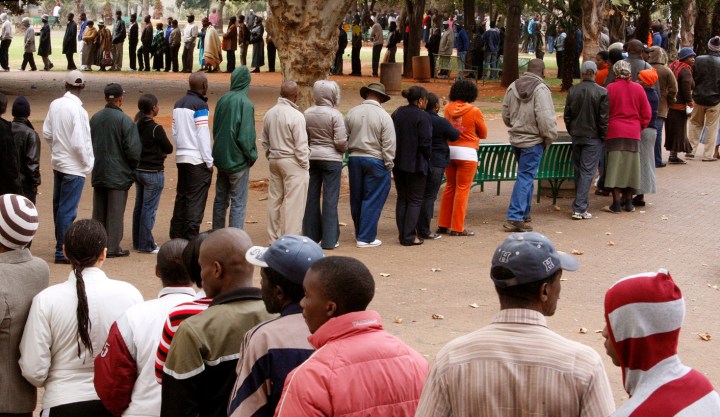South Africa
Lies and damn lies: Which trend is your friend?

It’s merely two weeks to election day and the air is soupy with polls and predictions and prognosticators. There are numbers everywhere, more than enough to cater for everyone’s bias and wish-list. How should you remain objective when analysts keep springing up like mushrooms after the summer rain? By PAUL BERKOWITZ.
Most people believe that the ANC will lose support, the DA will gain support and the EFF might make it to third place on the log. By ‘most people’ I mean that I believe this to be the case. Remember to watch out for the author’s bias (and if you don’t like my numbers I have lots of other ones for you).
The table below summarises some facts about the last three national/provincial elections (1999, 2004 and 2009) and the last municipal election, held in 2011:
|
1999 |
2004 |
2009 |
2011* |
|
|
Votes for the ANC |
10,601,330 |
10,880,915 |
11,650,748 |
8,405,429 |
|
% share of the vote |
66.4% |
69.7% |
65.9% |
62.9% |
|
Votes for the DA |
1,527,337 |
1,931,201 |
2,945,829 |
3,216,006 |
|
% share of the vote |
9.6% |
12.4% |
16.7% |
24.1% |
|
Voter turnout (% of registered voters) |
89% |
75% |
80% |
55% |
The ANC performed best in 2004 and came within two-thirds of the vote in the other two national/provincial elections. In the national/provincial elections the DA went from one vote in 10, to one vote in eight, to one vote in six – if you throw in the 2011 municipal election the party has won almost one in four votes.
A few hopeful souls are extrapolating from the DA’s successes in 2011 and some of them (particularly from within the party) were talking of large increases in the DA’s share of the national vote, even to the heady heights of 30%. Admittedly, official predictions from the party have been fewer and farther between in recent weeks.
There are a couple of good reasons why this calculus is fraught with problems and they all stem from one simple fact: a national/provincial election and a municipal election are two very different beasts. Turnout for the former has historically been much higher than for the latter.
The higher turnout in the national/provincial elections (between 75% and 89%) has been to the ANC’s benefit. The lower turnout of the municipal elections tends to favour the DA and some of the smaller parties. The constituency-based voting for ward councillors also favours the DA slightly.
You’ll note that turnout for 2011 was all the way down at 55% – and this was the highest turnout for a municipal election in the last 20 years. Only 8.4 million votes were cast for the ANC then, compared with between 10.6 million and 11.7 million for the three national/provincial elections.
On the other hand, the DA improved on its 2009 performance, increasing its tally from 2.9 million votes to 3.2 million. Maybe the party’s supporters do have reason to believe that its growth is robust and part of a longer trend?
The DA’s detractors would counter this argument by claiming that the party has reached its limits for growth. In 1999 and 2004 the DA benefitted from the NNP’s demise and in recent years it’s fed on the remains of the ID and COPE. Its only possible future growth (and the party will probably confirm this) will come from the votes of black Africans.
Personally, I think the truth lies somewhere in the middle of the 2009 and the 2011 results. If many erstwhile ANC voters stay home on 7 May and overall turnout is low, the DA will benefit. If the number of valid votes is closer to 18 million than to 20 million then the DA should end up with a bigger piece of a smaller pie.
This is not a very scientific analysis and it only pays lip service to the DA’s campaigning over the past three years. It also ignores whatever impact the EFF might make on the vote and does not talk about the magnitude of the ANC’s decline. (There’s another assumption and example of bias snuck in: the idea that the ANC can’t improve on its 2009 position.)
The broad assumption is therefore that the DA will poll between 17% and 24% in the upcoming elections, with similar predictions for the party’s provincial votes. I expect the figure to be closer to the upper bound than the lower bound
If the DA can improve on its 2011 achievements it should be free to bask in the sunshine for a bit. Unfortunately the party appears to have managed expectations upwards a bit too much: a 25% share of the national vote would imply at least one million new DA votes but many supporters would see this share of the vote as insufficient.
The DA will need to appeal strongly to new voters and former ANC voters. It must also hope that those it cannot win over will boycott the elections altogether. Are these realistic assumptions and likely scenarios? It depends on what your biases tell you. DM
Photo: Voters queue in Joubert Park to vote as an estimated 20 million other South African’s cast their vote in the presidential elections, Johannesburg, South Africa, 22 April 2009. EPA/KIM LUDBROOK


















 Become an Insider
Become an Insider